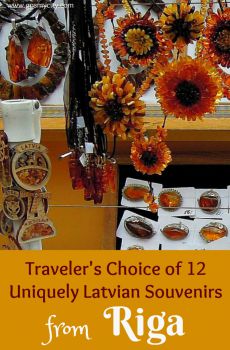
Traveler's Choice of 12 Uniquely Latvian Souvenirs from Riga
Reemerged after regaining independence in the early 1990s, Latvia is anxious to reveal its beauty to the outside world. The country's capital Riga is a good showroom for the country's cultural riches and traditions. Here's the list of the unique Latvian products to look for while in Riga!
(To visit the venues mentioned in this article, check out these Self-Guided Walking Tours in Riga)
Image Courtesy of: Güldem Üstün
1. Amber
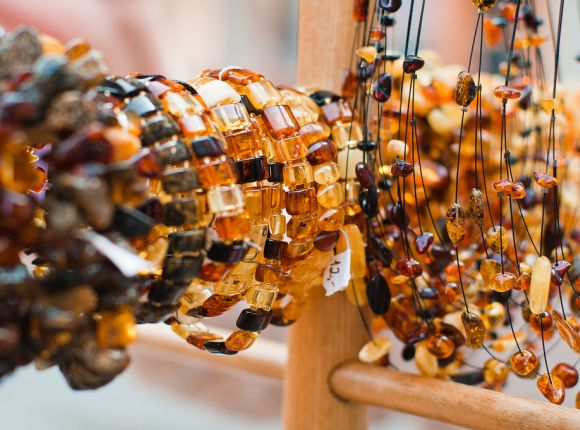
Image Courtesy of: Marina
Güldem Üstün
Amber is greatly appreciated for its color and natural beauty. It is also called "The Solar Stone" or "Baltic Gold" because of the Baltic Sea taking up 80% of the world's amber supply. Collected along the Baltic coast, amber soon appears on local markets and specialized shops in the form of necklaces, bracelets and various artwork, shimmering in 250 different shades. Color-wise, amber ranges from almost white to nearly black, and can be completely transparent or turbid, but the most common type is translucent yellow, resembling solidified drops of sun rays.
The Baltic region has been famous for its amber since ancient times. A Greek legend refers to amber as the tears of the Heliades, daughters of Helios. According to it, Phaethon, son of Helios, attempted to ride his father's chariot of fire across the sky, but lost control and fell to his death. The Heliades came down to cry for their brother and the gods transformed them into poplars and their tears into amber.
Few are aware that Riga has its own Amber Room! It is situated in the old part of town, known as Old Riga, near the city's oldest stone structure. The entire room is decorated with amber and silver, featuring amber rose ornaments, statues, chandeliers, frames and amber engraved walls. Having seen such splendor, one might definitely want to buy a little memento stone for themselves. A good place for that would be a shop network, called Amberline, specializing in amber trade for over 10 years now.
For traditional style amber craft, check out the Decorative Arts Museum. Its gift shop is small, but offers a wide range of handmade items, paintings and woven artifacts, as well as silver and amber gifts. The shopkeeper lady offers great advise and can even arrange for a custom design to be created by artists affiliated with the museum.
The amber prices vary significantly, which, in turn, provides good chance to find a real bargain. An amber trinket can cost from $5 upwards, while a pendant can reach from $9 up to $250.
The Baltic region has been famous for its amber since ancient times. A Greek legend refers to amber as the tears of the Heliades, daughters of Helios. According to it, Phaethon, son of Helios, attempted to ride his father's chariot of fire across the sky, but lost control and fell to his death. The Heliades came down to cry for their brother and the gods transformed them into poplars and their tears into amber.
Few are aware that Riga has its own Amber Room! It is situated in the old part of town, known as Old Riga, near the city's oldest stone structure. The entire room is decorated with amber and silver, featuring amber rose ornaments, statues, chandeliers, frames and amber engraved walls. Having seen such splendor, one might definitely want to buy a little memento stone for themselves. A good place for that would be a shop network, called Amberline, specializing in amber trade for over 10 years now.
For traditional style amber craft, check out the Decorative Arts Museum. Its gift shop is small, but offers a wide range of handmade items, paintings and woven artifacts, as well as silver and amber gifts. The shopkeeper lady offers great advise and can even arrange for a custom design to be created by artists affiliated with the museum.
The amber prices vary significantly, which, in turn, provides good chance to find a real bargain. An amber trinket can cost from $5 upwards, while a pendant can reach from $9 up to $250.
Where to find it:
Amberline:Their shops usually work from 10:00 till 20:00.
http://www.amberline.lv/
amber-line@mail.ru
Torna iela 4, Riga, Latvia
(+371) 67325058
Skunu iela 6, Riga, Latvia
(+371) 67220079
Audeju iela 16 (s/c Galerija Centrs), Riga, Latvia
Their shops usually work from 10:00 till 21:00.
(+371) 67104457
The Latvian National Museum of Art (LNMA)
10a K.Valdemara Street
Riga LV-1010, Latvia
(+371) 67 325051
lnmm@lnmm.lv
http://www.lnmm.lv/en/lnmm/
Every day 11:00 – 17:00, ticket desk 11:00 – 16:45
Fridays 11:00 – 20:00, ticket desk 11:00 – 19:45
Closed on Tuesdays
Buy It on Amazon:
Offline reading and travel directions:
With GPSmyCity App you can read this article offline on your mobile device, use the embedded offline city map and GPS navigation, as well as create a self-guided walk to visit the venues featured in the article.
2. Jewelry
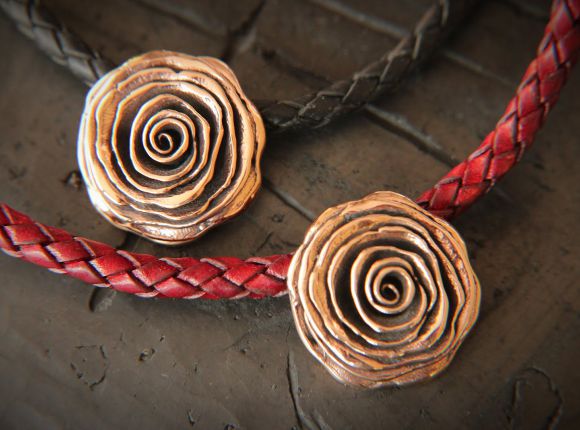
There is an old belief that anyone returning from Latvia should bring a silver ring for good luck. These rings are called Namejs. The traditional style jewelry - brooches, necklaces, rings and bracelets - crafted to the ancient Liv designs and methods, is rather commonplace in Riga. Many such pieces are distinctive and unique, and created in limited quantities.
If you are looking for something extravagant and avant garde, visit Putti, a gallery in the Old Town of Riga, showcasing the works of contemporary Latvian jewelers. Here, you can find some truly fine pieces made in silver, gold, copper, gems, ivory and other materials. Since ancient times, Latvians have regarded silver and gold as divine gifts, while copper symbolized protection and support in one's ventures. Each piece at Putti is handcrafted and thus unique. Prices vary from around $80 and up.
For those interested in the more traditional items, Baltu Rotas Gallery offers a large collection of jewelry reminiscent of the ancient Baltic designs. In recent years, such jewelry has gained much popularity. According to its creators, some of the pieces have been inspired by archaeological finds. The prices range from $25 to $150 for rings, brooches and pendants, $25 - $100 for earrings and cufflinks, and $50-$240 for bracelets.
If you are looking for something extravagant and avant garde, visit Putti, a gallery in the Old Town of Riga, showcasing the works of contemporary Latvian jewelers. Here, you can find some truly fine pieces made in silver, gold, copper, gems, ivory and other materials. Since ancient times, Latvians have regarded silver and gold as divine gifts, while copper symbolized protection and support in one's ventures. Each piece at Putti is handcrafted and thus unique. Prices vary from around $80 and up.
For those interested in the more traditional items, Baltu Rotas Gallery offers a large collection of jewelry reminiscent of the ancient Baltic designs. In recent years, such jewelry has gained much popularity. According to its creators, some of the pieces have been inspired by archaeological finds. The prices range from $25 to $150 for rings, brooches and pendants, $25 - $100 for earrings and cufflinks, and $50-$240 for bracelets.
Where to find it:
Putti, Peitavas iela 5, Centra rajons, Rīga, LV-1050, LatviaThe gallery is open Monday to Friday from 10:00 till 18:00 and Saturday from 11:00 till 17:00 and is closed on Sunday.
(+371) 67214229
www.putti.lv
gallery@putti.lv
Baltu Rotas, Grēcinieku iela 11/2 (opposite of St.Peters church), Riga, Latvia
The gallery is open Monday to Friday from 11:00 till 19:00, from 11:00 till 18:00 on Saturday, and is closed on Sunday.
(+371) 67220270
http://www.balturotas.lv
info@balturotas.lv
online shop: http://www.balticmall.com
Offline reading and travel directions:
With GPSmyCity App you can read this article offline on your mobile device, use the embedded offline city map and GPS navigation, as well as create a self-guided walk to visit the venues featured in the article.
3. Latvian Handicrafts

Image Courtesy of: inga_rtldy
Handcrafted table accessories, wicker baskets, leather wallets, notebooks and photo albums - these are just a few among many handcrafted items that catch one's eye upon arrival in Riga. Beautiful and unique, valued for a wonderful combination of relative cheapness and high quality, these cultural artifacts are greatly appreciated by tourists and locals alike. Prices vary from $3-$12 for a woven object, wooden toy or a cup, to some $60 and above for woven clothing, ceramic objects and other more complex items. Exclusively made artifacts demand special price.
The most typical place in town to buy handicrafts is Old Riga, namely the vicinity of St. Peter's Church or Livu Square. There's a great number of small carts loaded full with craft merchandise, including wooden and leather items, clay mugs, candle holders and little figurines of scheming demons (considered mostly as pesky rather than evil creatures, who may bring mischief but can be easily outsmarted).
Among the shops specialized in handicrafts the most notable is the Black Cat Souvenir Shop. There, you will find a wide range of goods handmade from wood, linen, glass and ceramics. The shop is easy to find, just look out for a huge black cat statue! It is open from 10:00 till 22:00. Another interesting shop to visit is called Dominja, and it carries a grand stock of wooden toys and educational games for all ages. You can even order a custom-made thing. The store is open Monday through Saturday from 11:00 till 19:00 and on Sunday from 11:00 till 17:00.
The most typical place in town to buy handicrafts is Old Riga, namely the vicinity of St. Peter's Church or Livu Square. There's a great number of small carts loaded full with craft merchandise, including wooden and leather items, clay mugs, candle holders and little figurines of scheming demons (considered mostly as pesky rather than evil creatures, who may bring mischief but can be easily outsmarted).
Among the shops specialized in handicrafts the most notable is the Black Cat Souvenir Shop. There, you will find a wide range of goods handmade from wood, linen, glass and ceramics. The shop is easy to find, just look out for a huge black cat statue! It is open from 10:00 till 22:00. Another interesting shop to visit is called Dominja, and it carries a grand stock of wooden toys and educational games for all ages. You can even order a custom-made thing. The store is open Monday through Saturday from 11:00 till 19:00 and on Sunday from 11:00 till 17:00.
Where to find it:
Livu Square, Līvu Laukums, Riga, LatviaBlack Cat, Mazā Jaunavu 8, Riga, Latvia
(+371) 67 22 55 87
Dominja, 3 Maiznicas iela, Riga, Latvia
dominna@inbox.lv
Offline reading and travel directions:
With GPSmyCity App you can read this article offline on your mobile device, use the embedded offline city map and GPS navigation, as well as create a self-guided walk to visit the venues featured in the article.
4. Pampalu Pots
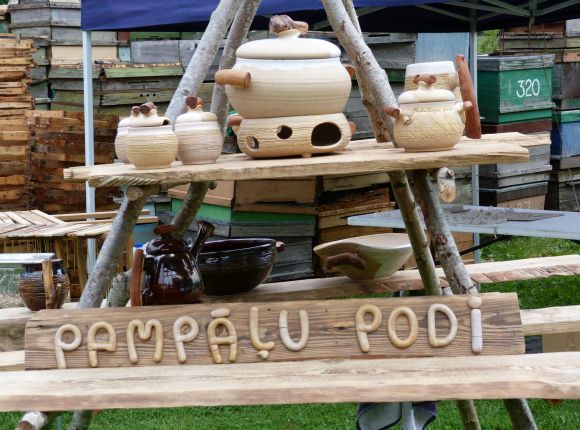
Pottery has existed in Latvia, as a craft, since the 10th century AD, over which period it has evolved considerably, seeing each region of the country develop its own distinctive style, shapes, colors and ornamentation. For example, the Vidzeme region is renowned for its massive and clean shapes, while the Latgale region produces shiny, baroque pots. The Kurzeme region specializes in jugs of monumental forms. What they all have in common, though, is the use of mythological signs and symbols in decoration.
In Riga, you can find these pots usually in combination with peat bog plant roots. These roots have many uses, among which is balneotherapy, a traditional spa treatment.
The pampalu pots combine practical use with artistic value and, as such, make for wonderful gifts. They can be bought at Griezhi, a souvenir shop selling linen, renovated antique furniture, pottery, copies of ancient jewellery and wooden toys. Also, each week on Thursday, the shop hosts traditional cooking presentations. Advanced reservation is advised. The store is open from 10:00 till 19:00.
And if you are interested in something more sophisticated, check out Art Noveau Riga, the only store in town specialized in Art Noveau items. En route to the shop, you may also appreciate the beauty of the surrounding area, filled with curious buildings and structures. Art Noveau Riga is open everyday from 10:00 till 19:00. Prices for traditional Latvian pots start at approximately $20.
In Riga, you can find these pots usually in combination with peat bog plant roots. These roots have many uses, among which is balneotherapy, a traditional spa treatment.
The pampalu pots combine practical use with artistic value and, as such, make for wonderful gifts. They can be bought at Griezhi, a souvenir shop selling linen, renovated antique furniture, pottery, copies of ancient jewellery and wooden toys. Also, each week on Thursday, the shop hosts traditional cooking presentations. Advanced reservation is advised. The store is open from 10:00 till 19:00.
And if you are interested in something more sophisticated, check out Art Noveau Riga, the only store in town specialized in Art Noveau items. En route to the shop, you may also appreciate the beauty of the surrounding area, filled with curious buildings and structures. Art Noveau Riga is open everyday from 10:00 till 19:00. Prices for traditional Latvian pots start at approximately $20.
Where to find it:
Art Noveau Riga, Strēlnieku Street 9, Riga, latvia(+371) 67333030
http://www.artnouveauriga.lv
info@artnouveauriga.lv
Griezhi, Maza Miesnieku iela 1, Riga, Latvia
(+371) 67507236
5. Riga Black Balsam
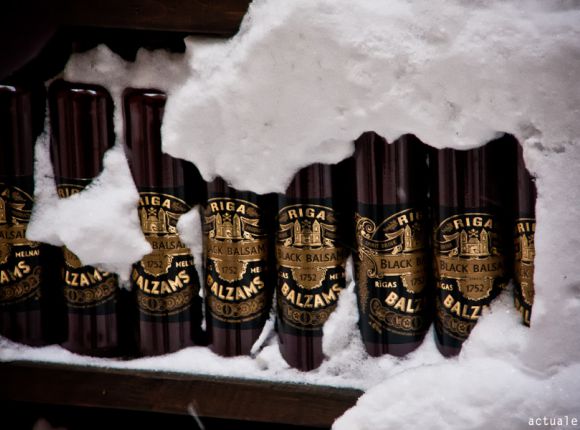
Image Courtesy of: actuale.net
Riga Black Balsam is considered to be one of Latvia's national symbols and is undoubtedly the most famous gift from Latvia. Proud recipient of more than 30 international awards, the balsam has been around for 200 years, initially produced as a cure-all elixir. Nowadays, it is still used as a remedy for hangover and stomach pains. The balsam is also widely applied in cocktails and coffee, same way as brandy. The ingredients comprise over 24 plants, flowers, buds, juices, roots, oils and berries, mixed in pure alcohol and aged in oak barrels, resulting in a 45% strong (90 proof) drink. The exact composition, however, is a commercial secret, fervently guarded by local producers.
The prices vary from $4 to $14, depending on the size of a bottle. Throughout Riga there are quite a few shops featuring the yellow sign - Latvijas Balzams. This is a dealership chain of the AS Latvijas Balzams distillery. The stores are usually open Monday to Friday from 08:00 till 22:00 and from 09:00 till 22:00 on Saturdays and Sundays.
The prices vary from $4 to $14, depending on the size of a bottle. Throughout Riga there are quite a few shops featuring the yellow sign - Latvijas Balzams. This is a dealership chain of the AS Latvijas Balzams distillery. The stores are usually open Monday to Friday from 08:00 till 22:00 and from 09:00 till 22:00 on Saturdays and Sundays.
Where to find it:
Audeju 8, Riga, Latvia(+371) 67228814
Skunu 16, Riga, Latvia
(+371) 67213118
Valnu 21, Riga, Latvia
(+371) 67229577
Smilsu 16, Riga, Latvia
(+371) 67350088
http://www.lb.lv
office@lb.lv
6. Traditional Latvian Wool Mittens
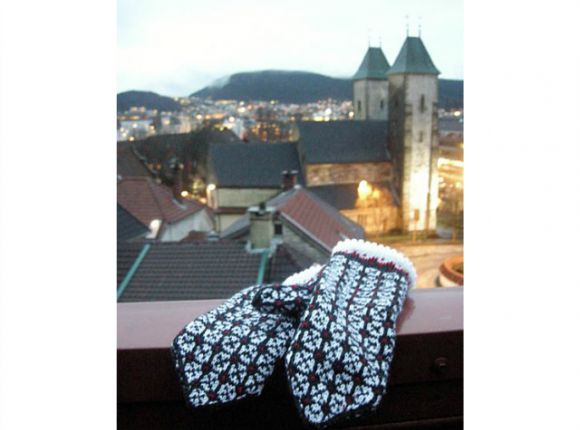
Image Courtesy of: Ann Myhre
With centuries of tradition woven in, Latvian wool mittens have proven lasting both historically and practically. There's a huge variety of colors and patterns to choose from and they say that each mitten tells a story, marks an anniversary or represents a certain part of the country. In 2006, traditional wool mittens were offered as gifts to foreign representatives at the NATO Summit in Riga. There were in total 4500 pairs presented and no two pairs were the same!
The diversity of patterns originate from a historic competition among women striving to produce some truly unique pieces. The mittens were also seen as a symbol of social status, which in turn motivated quest for more creative and intricate designs. The resulting creations were often offered as gifts at weddings and other grand celebrations. Since the 19th century, mittens have been the traditional gifts to godparents and clergymen at a child's christening. Also, if a young unmarried woman would give a pair of knitted mittens to a lad, it was considered as a sign of engagement. The mittens ornaments acted as a sort of symbolic language, expressing happiness, grief, humility, eagerness and other emotions.
Buying mittens is usually easier during winter holidays, e.g. the Christmas Market in Riga. Also, there are several specialized shops and kiosks throughout the city, including the ones in Livu Square (Līvu laukums). They are open daily from 10:00 to 20:00. The prices range from $4 upwards. A wide variety of mittens, along with many other souvenirs, can be found at Riga's Central Market, open Tuesday – Friday from 08:00 till 17:00 and Sunday – Monday from 08:00 till 16:00. Among the specialized shops, hand-knotted mittens can be found at Anna Minna. It sells Latvian arts and crafts and is open from 11:00 till 19:00, Monday through Saturday (closed on Sunday). Another shop to venture into is Tines. The fact that this is a family-run shop adds some coziness and warm feeling to each of their handmade knitwear. The shop is open Tuesday to Thursday between 14:00 and 17:00.
The diversity of patterns originate from a historic competition among women striving to produce some truly unique pieces. The mittens were also seen as a symbol of social status, which in turn motivated quest for more creative and intricate designs. The resulting creations were often offered as gifts at weddings and other grand celebrations. Since the 19th century, mittens have been the traditional gifts to godparents and clergymen at a child's christening. Also, if a young unmarried woman would give a pair of knitted mittens to a lad, it was considered as a sign of engagement. The mittens ornaments acted as a sort of symbolic language, expressing happiness, grief, humility, eagerness and other emotions.
Buying mittens is usually easier during winter holidays, e.g. the Christmas Market in Riga. Also, there are several specialized shops and kiosks throughout the city, including the ones in Livu Square (Līvu laukums). They are open daily from 10:00 to 20:00. The prices range from $4 upwards. A wide variety of mittens, along with many other souvenirs, can be found at Riga's Central Market, open Tuesday – Friday from 08:00 till 17:00 and Sunday – Monday from 08:00 till 16:00. Among the specialized shops, hand-knotted mittens can be found at Anna Minna. It sells Latvian arts and crafts and is open from 11:00 till 19:00, Monday through Saturday (closed on Sunday). Another shop to venture into is Tines. The fact that this is a family-run shop adds some coziness and warm feeling to each of their handmade knitwear. The shop is open Tuesday to Thursday between 14:00 and 17:00.
Where to find it:
Livu Square, Līvu Laukums, Riga, LatviaCentral Market, Nēģu iela 7, 1050 Rīga, Latvia
(+371) 67 22 9985
http://www.rct.lv
tirgus@rct.lv
Tines, 5 R.Vāgnera str., Riga, LV1050, Latvia
(+371) 67211009
Monday- Saturday 11a.m.- 7p.m.
http://www.tines.lv
info@tines.lv
(+371) 67211009
Skype: tines.lv
7. Sun Gifts
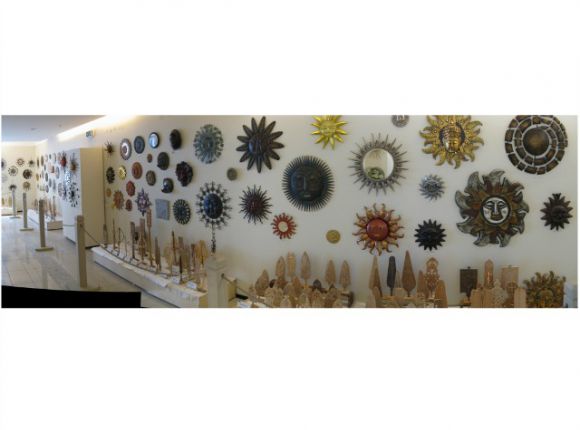
Image Courtesy of: SpirosK photography
Riga is a home to a one-of-a-kind museum, dedicated to the Sun. In Latvian mythology, the Sun is personified as a female deity (Saule) who provides welfare and regeneration to those living on Earth. It was considered very powerful and believed that the Sun could see and know everything. There are numerous folk songs, tales, beliefs and legends associated with the Sun. Its symbols are often depicted on national clothing, musical instruments and craft objects. Specifically such symbols have been collected by the Riga Sun Museum. And not only do they collect them, but also seek to contribute to the existing collection by encouraging visitors to design their own Sun symbols, some of which can make for a great gift to take home. The museum welcomes visitors everyday from 10:00 to 19:00. The admission + workshop fee is approximately $5 for adults, $4 for students and seniors, and $1 for children under 7. A workshop-only fee is $2.
Where to find it:
Sun Museum (Saules Muzejs),Vaļņu iela 30, Riga 1050, Latvia(+371) 29811610
http://www.saulesmuzejs.lv
edvards@saulesmuzejs.lv
8. Latvian Sweets

Image Courtesy of: Toms Baugis
Out on a walk around Old Riga, you will notice plenty of small shops offering chocolate desserts and confections. Latvians have always excelled at sugary pastries, honey cakes and, notably, chocolate, fit to excite anyone's taste buds with rich flavor. Riga's chocolate history goes back more than 100 years, having amassed, over the period, a great number of recipes. The oldest of local chocolate delights is the "Serenade" candy, produced by Laima chocolate factory. The latter is one of the most popular confectionery brands in the Baltics, recently celebrated its 140th anniversary. The "Serenade" candy has been manufatured since 1937. The ingredients include fruit jelly, apricots, nuts and, of course, the much loved Latvian-made "chocolate magic". Another sweet thing to bring home is the Prozit box of solid chocolate bottles filled with liqueur. Prices for Laima products vary between $5 to $7 for a chocolate bar and some $9 to $15 per box of chocolates.
If you crave something new, supple and exquisite, chocolate-wise, a good option would be visiting the Emihls Gustavs Chocolate cafe, centrally located near Hotel Reval. There, you'll be served a deliciously fragrant coffee and the best chocolate in town. All the chocolate confections there are handmade, created to some of Latvia's oldest recipes. Strictly no margarine, thickening agents or flavorings are used! Chocolate bars, candies and figurines sold at this cafe are an ideal gift item, especially if nicely warped in neat packages, adorned with a cute ribbon. What's more, the cafe frequently organizes workshops where visitors can try their hand at painting chocolate figurines.
Prices range from $9 and above.
If you crave something new, supple and exquisite, chocolate-wise, a good option would be visiting the Emihls Gustavs Chocolate cafe, centrally located near Hotel Reval. There, you'll be served a deliciously fragrant coffee and the best chocolate in town. All the chocolate confections there are handmade, created to some of Latvia's oldest recipes. Strictly no margarine, thickening agents or flavorings are used! Chocolate bars, candies and figurines sold at this cafe are an ideal gift item, especially if nicely warped in neat packages, adorned with a cute ribbon. What's more, the cafe frequently organizes workshops where visitors can try their hand at painting chocolate figurines.
Prices range from $9 and above.
Where to find it:
Laima shops:www.laima.lv
laima@laima.lv
Usually, Laima shops are open from 08:00 till 19:00 on working days, from 10:00 till 17:00 on Saturday and from 10:00 till 16:00 on Sunday. Some shops may be closed during holidays.
Miera street 22, Riga, Latvia
(+371) 67370554
Tallinas street 72/74, Riga, Latvia
(+371) 67292495
"Origo", Syacijas laukums 2, Riga, Latvia
(+371) 67073150
"Alfa", Brivibas gatve 372, Riga, Latvia
(+371) 67071632
9. Latvian Honey

Image Courtesy of: Florence3
Latvians love their honey! The organic honey produced in Latvia is rich in vitamins and minerals, which in turn adds to its rich consistency and wholesomeness. A particularly contributing factor here is specific climate of the region, favoring a wide variety of plants, resulting in the numerous types of honey available in the country, from buckwheat and heather to the famous linden blossom honey. The tradition of offering honey as a gift in Latvia dates back to the times prehistoric. It is very much practiced today as well and, in recent years, the Latvian honey has gained international popularity.
The best place to buy honey in Riga is Medus, a specialty store frequented by tourists and locals alike. The name - Medus - is the Latvian word for "bee". The array of honey-related products here is mind-bogging and will definitely expand your perception of honey production and its many uses. Aside from the usual little jars, honey is offered here in the form of large wheels resembling cheese. Available at the store sampling pots will allow you to try various honeys - of different taste and color - before buying. A small pot of honey costs around $3. The shop is open Monday to Friday from 08:00 till 20:00 and on Saturday and Sunday from 09:00 till 17:00.
The best place to buy honey in Riga is Medus, a specialty store frequented by tourists and locals alike. The name - Medus - is the Latvian word for "bee". The array of honey-related products here is mind-bogging and will definitely expand your perception of honey production and its many uses. Aside from the usual little jars, honey is offered here in the form of large wheels resembling cheese. Available at the store sampling pots will allow you to try various honeys - of different taste and color - before buying. A small pot of honey costs around $3. The shop is open Monday to Friday from 08:00 till 20:00 and on Saturday and Sunday from 09:00 till 17:00.
Where to find it:
Medus veikals, A. Kalniņa 1a, 1050 Riga, Latvia(+371) 67911275
sia_deiva@e-apollo.lv
10. Beer
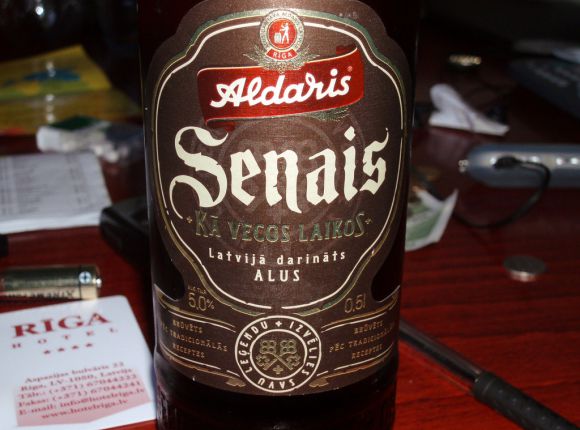
Image Courtesy of: DAVID HOLT
Go far and wide throughout Riga, appreciate the beauty of the city, the local culture and art scene, and then, if you feel thirsty or tired, make way to a nearest bar or pub and proceed with exploring Latvia's richness through its beer. Beer is highly appreciated in Latvia after centuries of German influence, a fact you will come to believe after your first gulp. Latvian beer is rightfully considered among the best in the world. The main reason for that being the excellent quality of the ingredients used and the production process. Famed local brands include Aldaris, Cesis, Valmiermuiza and the hard to find outside Latvia - Uzavas, Bauska and Tervetas. All of these can be found throughout Riga in most pubs/bars and grocery stores.
For a wider variety, venture into the Riga Spirits & Wine Outlet, the first specialized liquor store in the city, located downtown, or Rimi Centrs, a supermarket with a good selection of Latvian bottled beers. The Riga Spirits and Wine Outlet is open Monday to Saturday from 10:00 till 20:00 and Sunday from 10:00 till 18:00. Rimi Centrs is open from 08:00 till 22:00. Prices range from $1.90 for 0.5L and up.
For a wider variety, venture into the Riga Spirits & Wine Outlet, the first specialized liquor store in the city, located downtown, or Rimi Centrs, a supermarket with a good selection of Latvian bottled beers. The Riga Spirits and Wine Outlet is open Monday to Saturday from 10:00 till 20:00 and Sunday from 10:00 till 18:00. Rimi Centrs is open from 08:00 till 22:00. Prices range from $1.90 for 0.5L and up.
Where to find it:
Stockmann Supermarket, 13 Janvara iela 8, Riga 1050 One store which you will see when exiting the bus from the airport is Stockmann Supermarket. It has a good selection of beers offered for fair prices. It is open between 09:00 and 22:00 from Monday to Saturday and between 10:00 and 22:00 on Sunday.
(+371) 6 707 1222
klientuinfo@stockmann.com
http://www.stockmann.lv/portal/1717
Riga Spirits & Wine Outlet, Andrejostas iela 4, Riga, Latvia
(+371) 278 544 50
info@rswo.lv
http://www.rswo.lv
Monday to Saturday from 10:00 till 20:00 and Sunday from 10:00 till 18:00.
Rimi Centers:
(+371) 6 7045 409
info.lv@rimibaltic.com
http://www.rimi.lv
08:00 till 22:00.
Rimi hipermārkets Mols
Krasta iela 46, Rīga, Latvia
+371 67 030 201
56.933871 24.143612
Rimi hipermārkets Olympia
Āzenes iela 5, Rīga, Latvia
+371 67 065 655
Rimi
(+371) 6 7045 409
Audēju iela 16, Riga, Latvia
Rimi
(+371) 6 7045 409
Stacijas laukums 2, Riga, Latvia
11. Linen
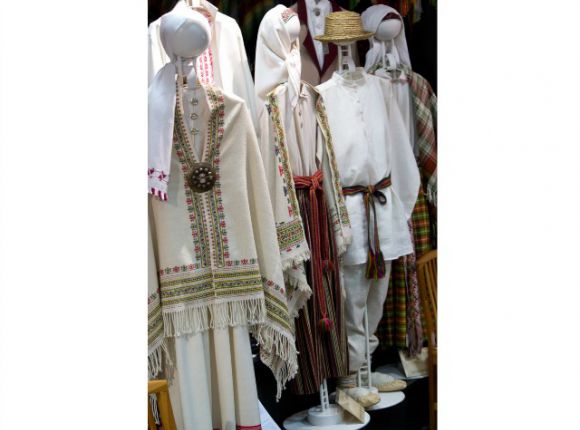
Image Courtesy of: ilze long
Linen, made of flax, is the traditional fabric of Latvia. Flax linen is lightweight, ecological, natural and perfect for any weather. Linen clothing has been worn in Latvia for centuries and its popularity has remained cyclically present. Nowadays, you can see many Latvians wearing linen blouses, shirts and jackets. These are called ethno–clothing. Linen is also the prime material for the Latvian national costumes, which are adorned with intricate patterns symbolizing, in a way, the love of Latvians for their country. Oftentimes, the patterns reveal social and marital status of the wearer, their age, wealth and traditions. Latvian national costumes are worn even today, during song and dance festivals held in Riga every four years, as well as on the Midsummer Night (June 23), which is the most popular national holiday in the country.
Prices for linen ethno-clothing usually range from $15 to $40. Linen garments together with bags, slippers, as well as linen oil paintings can be found at the Linen Fantasies shop in Riga, open from 11:00 till 16:00. Another shop specialized in linen is called Livs, and is open Monday-Saturday from 10:00 till 18:00 and on Sunday from 10:00 till 16:00. The Tines shop offers linen clothes and accessories made to traditional Latvian designs and stenographic reproductions. They also fulfill custom orders. The store is open Monday to Saturday from 11:00 and 19:00 and till 16:00 on Sunday. One might also venture into Laipa, the store offering a delightful collection of hand-woven linen articles; open daily from 10:00 to 18:00. For a wide selection of Latvian national costumes, check out Sena Klets (The Old Barn) shop of the National Costume Center. Sena Klets is open from 10:00 till 19:00 on weekdays and from 10:00 till 17:00 on Saturday and Sunday.
Prices for linen ethno-clothing usually range from $15 to $40. Linen garments together with bags, slippers, as well as linen oil paintings can be found at the Linen Fantasies shop in Riga, open from 11:00 till 16:00. Another shop specialized in linen is called Livs, and is open Monday-Saturday from 10:00 till 18:00 and on Sunday from 10:00 till 16:00. The Tines shop offers linen clothes and accessories made to traditional Latvian designs and stenographic reproductions. They also fulfill custom orders. The store is open Monday to Saturday from 11:00 and 19:00 and till 16:00 on Sunday. One might also venture into Laipa, the store offering a delightful collection of hand-woven linen articles; open daily from 10:00 to 18:00. For a wide selection of Latvian national costumes, check out Sena Klets (The Old Barn) shop of the National Costume Center. Sena Klets is open from 10:00 till 19:00 on weekdays and from 10:00 till 17:00 on Saturday and Sunday.
Where to find it:
Tines, 5 Amatu street, Riga LV1050, Latvia(+371) 67211009
http://www.tines.lv
info@tines.lv
Skype: tines.lv
Linen Fantasies, Elizabetes 22, Third Floor - Suite 6,
Cross K. Barona & Marijas, Riga 1050, Latvia
http://www.linen.lv/
helpdesk@healthylinen.com
Livs, Kaleju iela 7, Latvia, Riga
Monday to Saturday form 10:00 till 18:00 and Sunday from 10:00 till 16:00
(+371) 67229010
Sena Klets, Rātslaukums 1 (Passage), Riga 1050, Latvia
(+371) 67242398
10:00 till 19:00 on the working days and from 10:00 till 17:00 Saturday and Sunday.
http://www.senaklets.lv
info@senaklets.lv
Laipa, Laipu iela 2, Riga, Latvia
10:00 till 18:00.
(+371)67229962
12. Lielvārdes Josta (Lielvārde Belt)
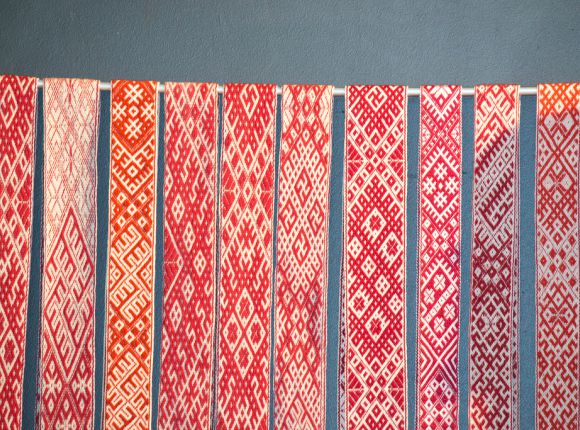.jpg)
Image Courtesy of: ilze long
Lielvārde Belt is a unique element of the Latvian folk costume. Made from linen and woolen yarn, the woven fabric carries 22 ancient symbols similar to those featured on the Latvian banknotes. These designs, especially the ones associated with dievturība (a modern revival of Latvia's ancient religion preceding Christianity), are widely used nowadays by many folklore artists.Some researches believe these patterns contain coded information about cosmic genesis. Woven with red and white worsted, it follows the local myths of cosmic codes enclosed within ancient objects. The Estonian graphic artist Tenu Vint has first speculated that the Lielvarde Belt reveals a unique insight into a code of an ancient civilization which might tell the story of the universe. At the same time, historically the belt has been considered to bring protection to its wearer.
The belt was also one of the most powerful symbols during the Latvian national awakening movement in the 1980s. Its importance stands strong even today. Thus, aside from mystical interpretation, its utmost value lies in its powerful symbolism for the Latvians. To find Lielvārdes Josta you will have to venture to Sena Klets, the only shop in the country specializing in authentic folk costumes. It is open from 10:00 till 19:00 Monday to Friday and from 10:00 till 17:00 on Saturday and Sunday. The prices for Lielvarde Belt start from $100 and upwards.
The belt was also one of the most powerful symbols during the Latvian national awakening movement in the 1980s. Its importance stands strong even today. Thus, aside from mystical interpretation, its utmost value lies in its powerful symbolism for the Latvians. To find Lielvārdes Josta you will have to venture to Sena Klets, the only shop in the country specializing in authentic folk costumes. It is open from 10:00 till 19:00 Monday to Friday and from 10:00 till 17:00 on Saturday and Sunday. The prices for Lielvarde Belt start from $100 and upwards.
Where to find it:
Sena Klets, Rātslaukums 1, Riga 1050, Latvia(+371) 67242398
http://www.senaklets.lv
info@senaklets.lv
13. Traditional Latvian Music
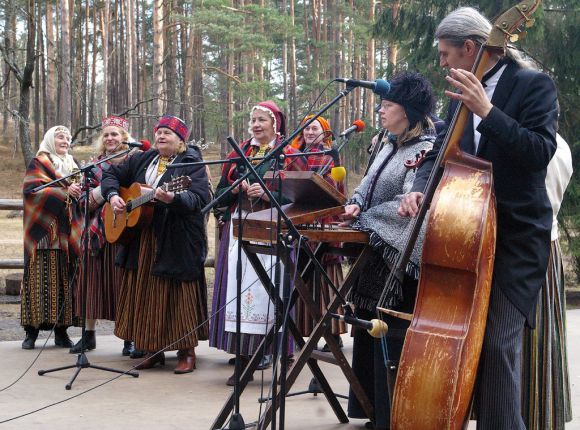
Image Courtesy of: Donald Judge
Traditional music is an essential part of Latvian culture, you can hear it during various celebrations and festivals. What is most curious about it is that it is usually quite short and its verses represent quatrains, that is, four lines of poetry that do not rhyme (!). It is because a Latvian traditional song could represent an invocation, plight or merriment, it can be happy, sad, obscene, angry, insulting or funny. It can also address deities, humans or animals. In contrast to folk music from other cultures, Latvian traditional music does not have any legendary heroes. The story of the song usually revolves around Latvian per-christian deities and dabs into the lives of the people, especially life's three most important events: birth, marriage and death. The fundamental instrument for Latvian folk music is the zither, a string instrument. It is played by plucking the strings while laying the instrument on a flat surface which will contribute to the resonance of the sound. The creation resulting from combining the sounds of the traditional instruments and the drone vocal styles is truly magical, both due to the enchanting combination of sounds and the expertly woven words.
"This morning the sun rose up
Out of a scarlet tree.
Young boys will grow elderly
Trying to find that tree. "
The most visited shop selling Latvian folk music in Riga is UPE. It is open Monday to Friday from 10:00 till 19:00 and Saturday from 10:00 till 15:00 (closed on Sunday). Prices range from $10 to $20.
"This morning the sun rose up
Out of a scarlet tree.
Young boys will grow elderly
Trying to find that tree. "
The most visited shop selling Latvian folk music in Riga is UPE. It is open Monday to Friday from 10:00 till 19:00 and Saturday from 10:00 till 15:00 (closed on Sunday). Prices range from $10 to $20.
Other Interesting Souvenirs from Latvia
If you are away from Latvia and have no plans to visit this Baltic state any time soon, or simply have no spare room in your luggage to carry back home, these days you can find a wide selection of authentic and truly interesting Latvian souvenirs online. Presented here are some of the top Latvian products sought by foreign visitors, now available online for your convenience.
1. Stenders Cosmetics -The “Gardener of Feelings” is a popular Latvian beauty brand that draws inspiration from the nature of Northern Europe in a bid to create products that are as much effective as uplifting.
2. Latvian Smoked Sprats -Tiny, fine, amber fish naturally smoked over oak hardwood and packed with sunflower oil in 160g tins, packed (heads off) in neat layers. You can eat them straight out of a can, on top of the black rye bread, as the side dish of mashed potatoes, or mash them with a fork and mix with hot cooked pasta. Truly delicious, they may easily become your new pantry staple!
3. Lats Coin -Metallic coins of the former Latvian currency circulated before the country was made part of the Soviet Union in 1940 and after it regained independence in 1992, up until Latvia adopted the Euro on 1 January 2014. A numismatic rarity of some sort.
Get GPSmyCity App for IOS or Android
You can read offline thousands of travel articles like this one in the "GPSmyCity: Walks in 1K+ Cities" app on Apple App Store or Google Play Store. The apps also offer city offline maps and GPS navigation to guide you to the places featured in the articles.
Walking Tours in Riga, Latvia
Create Your Own Walk in Riga
Creating your own self-guided walk in Riga is easy and fun. Choose the city attractions that you want to see and a walk route map will be created just for you. You can even set your hotel as the start point of the walk.
Historical Churches and Cathedrals
One great thing about Riga is that the majority of its religious sites are concentrated in the historic center. A variety of faiths found in the Latvian capital is fairly broad for such a small country and includes Roman Catholic, Orthodox, and Lutheran, to mention but a few.
The 13th-century Riga Cathedral is perhaps the most significant house of prayer in the city. The imposing mix of... view more
Tour Duration: 2 Hour(s)
Travel Distance: 3.0 Km or 1.9 Miles
The 13th-century Riga Cathedral is perhaps the most significant house of prayer in the city. The imposing mix of... view more
Tour Duration: 2 Hour(s)
Travel Distance: 3.0 Km or 1.9 Miles
Riga Old Town Walking Tour
The area that is home to present-day Riga has hosted inhabitants since the days of the Vikings. With a sheltered natural harbor nearby, the River Daugava made Riga a stop on the Vikings' Dvina-Dnieper trade route to Byzantium.
Trade allowed the area to flourish, and the Livs, a Finnic tribe, settled it. In the early Middle Ages, the town's economy revolved around fishing, trading, and... view more
Tour Duration: 2 Hour(s)
Travel Distance: 2.4 Km or 1.5 Miles
Trade allowed the area to flourish, and the Livs, a Finnic tribe, settled it. In the early Middle Ages, the town's economy revolved around fishing, trading, and... view more
Tour Duration: 2 Hour(s)
Travel Distance: 2.4 Km or 1.5 Miles
Art Nouveau Architecture Walk
An architecture lover in general and that of Art Nouveau in particular will find plenty to look at in the quiet center of Riga. Jūgendstil (Latvian: Art Nouveau) architecture makes up roughly one third of all buildings in the heart of Latvia's capital. In fact, the city boasts the highest concentration of Art Nouveau structures anywhere in the world.
Constructed during a period of rapid... view more
Tour Duration: 1 Hour(s)
Travel Distance: 1.3 Km or 0.8 Miles
Constructed during a period of rapid... view more
Tour Duration: 1 Hour(s)
Travel Distance: 1.3 Km or 0.8 Miles















